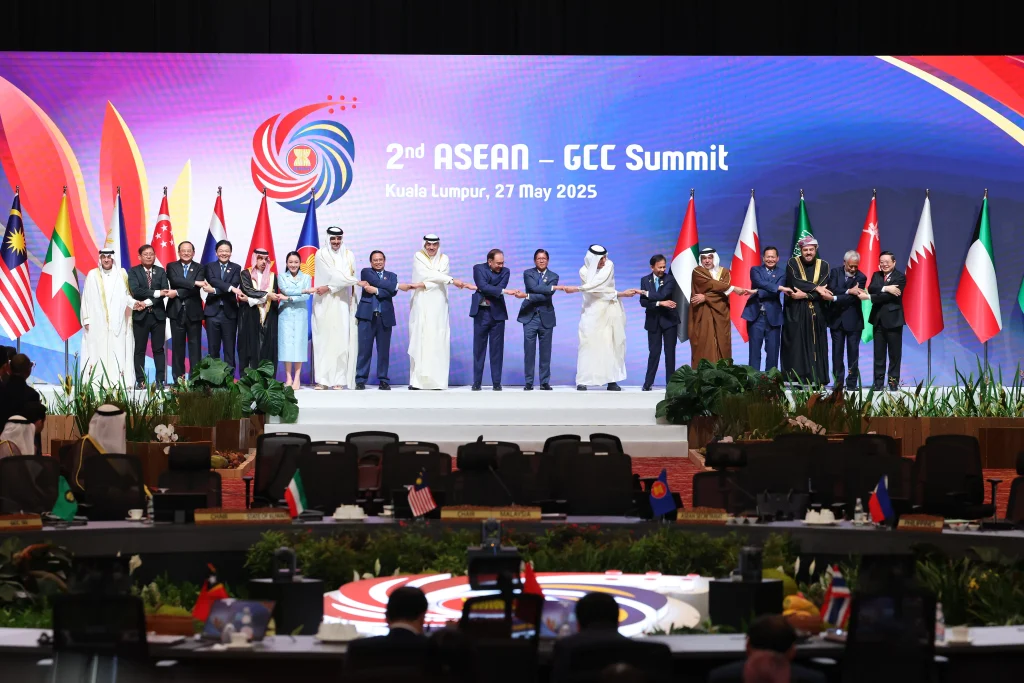[KUALA LUMPUR] In a turbulent world, Asean and the Gulf Cooperation Council (GCC) can do more to promote trade and investment, as well as advance common interests in energy transition and the digital economy, Singapore’s Prime Minister Lawrence Wong said on Tuesday (May 27).
Speaking at the second Asean-GCC Summit, PM Wong said the blocs should strengthen their ties, with the global environment now much more uncertain since the inaugural summit two years ago.
With relations having been “boosted” by the 2023 Framework of Cooperation, the blocs can build on this to “forge even closer links”, he said, suggesting three areas of focus.
First, he pushed for more trade and investment, including exploring an Asean-GCC free trade agreement (FTA).
Singapore was the first non-Middle Eastern country to ink an FTA with the GCC, with upgrades now being discussed, noted PM Wong.
This deal can serve as a pathfinder for a wider region-to-region FTA, he said: “Such an FTA will lower tariffs, strengthen supply chains, promote food security and enhance investment flows between our regions.”
A NEWSLETTER FOR YOU

Friday, 8.30 am
Asean Business
Business insights centering on South-east Asia’s fast-growing economies.
He also suggested exploring collaboration between the GCC and the Regional Comprehensive Economic Partnership (RCEP), which would connect the Middle East and the Asia-Pacific economically.
Combined, both groupings represent a “significant” 35 per cent of the world’s GDP, he noted.
While an FTA between RCEP and GCC would be very complex, a formal partnership would facilitate trade and investment while helping to uphold key principles of the rules-based trading system, he added.
Second, the energy transition is another area of common interest. PM Wong welcomed the GCC’s support for the Asean Power Grid, from investing in and financing grid infrastructure, to sharing knowledge on cross-border energy transmission.
“As Asean’s demand for clean energy grows, there will also be opportunities for cooperation with the GCC on this front,” he added.
Third, Asean could consider a digital partnership with the GCC, once it concludes its own Digital Economy Framework Agreement this year.
The Asean agreement will provide a basis for the bloc to engage external partners in this domain, noted PM Wong. “We welcome further cooperation with the GCC on the enablers of the digital economy – including in cybersecurity, data governance and cross-border data flows.”
Finally, broaching the issue of Palestine, PM Wong said: “Between the GCC and Asean, we have always stood for an approach of engagement and dialogue to uphold peace and stability, and this is very important as we confront the ongoing conflicts in the world.”
“Singapore continues, and joins colleagues around the table, to call for an immediate ceasefire and the return of the remaining hostages.”
He called for all parties to comply with international law, including international humanitarian law, and reiterated Singapore’s longstanding support for a negotiated two-state solution.
Bilateral meetings
At the sidelines of the summit, PM Wong met the Emir of Qatar Tamim bin Hamad Al Thani for the first time since he became prime minister in 2024.

They first met in 2017 when PM Wong was minister in attendance during the emir’s state visit to Singapore.
In a social media post on Tuesday, PM Wong said: “I look forward to working closely with His Highness to further deepen our multifaceted cooperation – as we navigate an increasingly complex and challenging global landscape together.”

Separately, he also met Bahrain Crown Prince and Prime Minister Salman bin Hamad Al Khalifa.
Noting that Singapore and Bahrain are small island states of about the same land size, PM Wong said: “We share a similar outlook – always trying to find relevance and add value to the world.”
Both countries have much to gain from the mutual sharing of experiences and best practices, he said, adding that he looks forward to working together to enhance their partnership.


